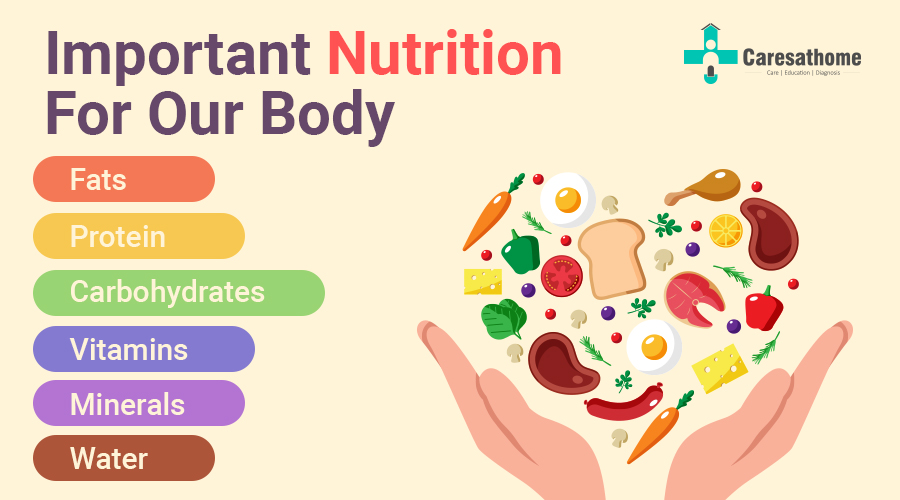Important Nutrition for Our Body: Key Nutrients for Health and Well-being
Good nutrition is the foundation of a healthy body. It provides the energy and nutrients needed for growth, repair, and daily functions, and plays a crucial role in disease prevention. A well-balanced diet ensures that our body gets the right amount of essential nutrients. Below are the key nutrients that are essential for our health and the functions they support:
1. Carbohydrates
- Role: Carbohydrates are the body’s primary source of energy. They are broken down into glucose, which fuels the brain, muscles, and other vital organs.
- Sources: Whole grains (brown rice, oats, quinoa), fruits, vegetables, legumes (beans, lentils), and starchy foods (sweet potatoes, peas).
- Tip: Opt for complex carbohydrates (whole grains, vegetables) over refined sugars and white flour to ensure steady energy release and improve digestion.
2. Proteins
- Role: Proteins are the building blocks of the body. They are essential for growth, muscle repair, immune function, and the production of enzymes and hormones.
- Sources: Lean meats (chicken, turkey), fish, eggs, dairy products (milk, yogurt), legumes, tofu, and nuts.
- Tip: Aim for a variety of protein sources, especially plant-based proteins, to support muscle health and overall bodily functions.
3. Fats
- Role: Fats are essential for energy storage, cell structure, and the absorption of fat-soluble vitamins (A, D, E, K). Healthy fats also support brain function and help regulate hormones.
- Sources: Healthy fats come from sources like avocados, olive oil, nuts, seeds, and fatty fish (salmon, mackerel). Limit saturated fats found in processed and fried foods.
- Tip: Focus on unsaturated fats, such as omega-3 and omega-6 fatty acids, for heart health and brain function.
4. Vitamins
- Role: Vitamins are vital for various bodily functions, including immune health, vision, skin health, energy production, and bone strength. Each vitamin serves a specific purpose:
- Vitamin A: Supports vision, immune function, and skin health.
- Vitamin C: Important for immune function, skin health, and collagen production.
- Vitamin D: Crucial for bone health and calcium absorption.
- Vitamin E: Acts as an antioxidant and protects cells from damage.
- Vitamin K: Essential for blood clotting and bone health.
- Sources: Fruits, vegetables, leafy greens, dairy, eggs, and fortified foods.
- Tip: Eat a colorful variety of fruits and vegetables to ensure you’re getting a range of vitamins for overall health.
5. Minerals
- Role: Minerals are critical for bone health, nerve function, fluid balance, and muscle contractions. Important minerals include:
- Calcium: Supports strong bones and teeth.
- Iron: Necessary for oxygen transport and energy production.
- Magnesium: Plays a role in muscle function, nerve transmission, and energy production.
- Potassium: Helps regulate blood pressure and fluid balance.
- Zinc: Supports the immune system, wound healing, and protein synthesis.
- Sources: Dairy products, meat, seafood, beans, nuts, seeds, leafy greens, and whole grains.
- Tip: Focus on getting minerals from natural foods rather than supplements to promote better absorption and balance.
6. Fiber
- Role: Fiber is essential for digestive health. It helps regulate bowel movements, lowers cholesterol, and may reduce the risk of certain diseases like heart disease and type 2 diabetes.
- Sources: Whole grains, fruits, vegetables, legumes (beans, lentils), and nuts.
- Tip: Aim for 25-30 grams of fiber per day by incorporating fiber-rich foods into every meal.
7. Water
- Role: Water is crucial for all body functions. It helps regulate body temperature, transports nutrients, supports digestion, and removes waste products from the body.
- Sources: Drink plenty of water throughout the day, and include foods with high water content, like fruits and vegetables.
- Tip: Aim for at least 8 cups (2 liters) of water per day, or more if you are physically active or in hot climates.
8. Antioxidants
- Role: Antioxidants protect the body’s cells from damage caused by free radicals. They play a significant role in reducing inflammation and lowering the risk of chronic diseases like cancer, heart disease, and neurodegenerative conditions.
- Sources: Berries, nuts, seeds, dark chocolate, leafy greens, and brightly colored fruits and vegetables (like carrots, spinach, and bell peppers).
- Tip: Include antioxidant-rich foods in your diet for better immune health and to protect against cellular damage.
9. Phytochemicals
- Role: These naturally occurring compounds in plants have protective effects against diseases and promote overall health. Common examples include flavonoids, carotenoids, and polyphenols.
- Sources: Fruits and vegetables, tea, whole grains, nuts, seeds, and legumes.
- Tip: Eat a wide variety of plant-based foods to reap the benefits of different phytochemicals.
Conclusion
A balanced diet rich in essential nutrients is key to maintaining a healthy body and mind. By incorporating a wide variety of whole, nutrient-dense foods, you can ensure that your body gets the right amount of vitamins, minerals, fiber, and healthy fats needed to function at its best. Prioritize nutrient-rich foods, stay hydrated, and maintain a balanced lifestyle to promote long-term health and well-being. Remember, small changes to your eating habits can have a big impact on your overall health!

